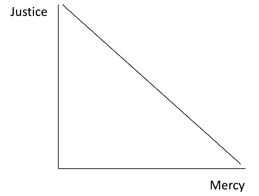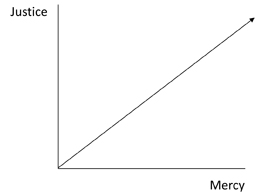The grain Joseph’s brothers brought back from Egypt didn’t outlast the famine. “Return, buy us a little more food,” their father said. But Judah said to him, “The man solemnly warned us, ‘You will not see my face unless your brother is with you.’ If you send our brother [Joseph’s younger brother Benjamin] with us, we’ll go down and buy food for you. But if you will not send him, we won’t go down there because the man said to us, ‘You will not see my face unless your brother is with you.’”[1]
At first Jacob (also called Israel by God) remained reluctant. When Judah reminded him how the Egyptian [their brother Joseph] had questioned them, and promised to be surety for Benjamin, their father Israel said to them, “If it must be so, then do this: Take some of the best products of the land in your bags, and take a gift down to the man – a little balm and a little honey, spices and myrrh, pistachios and almonds. Take double the money with you; you must take back the money that was returned in the mouths of your sacks – perhaps it was an oversight.”[2] This reminds me of the strategy Jacob employed when he returned home and met his estranged brother Esau.[3]
But Israel continued, “Take your brother too, and go right away to the man. May the sovereign God grant you mercy before the man so that he may release your other brother and Benjamin! As for me, if I lose my children I lose them.”[4]
You are making me childless! Jacob had complained to his sons. Joseph is gone. Simeon is gone. And now you want to take Benjamin! Everything is against me.[5] But Israel was willing to trust the sovereign God with the outcome. Yes, they are the same man, but it reminds me of those born of the flesh of Adam and born from above of the Spirit of God. For the flesh has desires that are opposed to the Spirit, and the Spirit has desires that are opposed to the flesh, Paul wrote the Galatians, for these are in opposition to each other, so that you cannot do what you want.[6]
Joseph’s brothers returned with Benjamin to Egypt. When Joseph saw Benjamin with them, he said to the servant who was over his household, “Bring the men to the house. Slaughter an animal and prepare it, for the men will eat with me at noon.” The man did just as Joseph said; he brought the men into Joseph’s house.[7] Joseph invited his brothers to a meal, but the men were afraid (yârêʼ)[8] when they were brought to Joseph’s house. They said, “We are being brought in because of the money that was returned in our sacks last time. He wants to capture us, make us slaves, and take our donkeys!”[9] As far as I can tell the rabbis who translated the Septuagint left this particular fear out of their Greek translation.
Joseph’s brothers approached the man who was in charge of Joseph’s household and spoke to him at the entrance to the house. They said, “My lord, we did indeed come down the first time to buy food. But when we came to the place where we spent the night, we opened our sacks and each of us found his money – the full amount – in the mouth of his sack. So we have returned it. We have brought additional money with us to buy food. We do not know who put the money in our sacks!”[10]
“Everything is fine,” the man in charge of Joseph’s household told them. “Don’t be afraid (yârêʼ). Your God and the God of your father has given you treasure in your sacks. I had your money.” Then he brought Simeon out to them.[11] In Greek in the Septuagint afraid was φοβεῖσθε (a form of φοβέω).[12] Do not be afraid (φοβεῖσθε) of those who kill the body but cannot kill the soul, Jesus told his disciples. Instead, fear (φοβεῖσθε) the one who is able to destroy both soul and body in hell.[13] Jesus was sending them to their deaths. That sounds ominous, but Jesus is sending all of us to our deaths whether we believe Him or not. One may die a martyr serving the Savior, another may choke out his last breath from advanced emphysema or heart failure or a brain tumor, but (with the possible exception of those alive and trusting Christ at the time of His return) we are all going to die, or sleep as the New Testament writers seemed to prefer to call it.
The one who is able to destroy both soul and body in hell is either God the Father, or the Lord Jesus Himself if I take his teaching literally: For the Father loves the Son and shows him everything he does, and will show him greater deeds than these, so that you will be amazed. For just as the Father raises the dead and gives them life, so also the Son gives life to whomever he wishes. Furthermore, the Father does not judge anyone, but has assigned all judgment to the Son, so that all people will honor the Son just as they honor the Father. The one who does not honor the Son does not honor the Father who sent him.[14] All authority in heaven and on earth has been given to me, Jesus said. Therefore go and make disciples of all nations, baptizing them in the name of the Father and the Son and the Holy Spirit, teaching them to obey everything I have commanded you. And remember, I am with you always, to the end of the age.[15]
So Matthew 10:28 contains a New Testament occurrence of the fear of the Lord. It’s also a no-win scenario for Bible translators. The first part of Jesus’ statement is fairly clear: Do not be afraid of those who kill the body but cannot kill the soul. Jesus doesn’t want his followers to be terrified into fleeing from, or struck with fear by, those who kill the body but cannot kill the soul. He doesn’t want that fear to stop one from believing or even professing faith in Him.
Still there are other definitions of φοβεῖσθε listed in the NET online Bible. There may be plenty of good reason to be “startled by strange sights or occurrences,” “struck with amazement,” even “to fear” or “be afraid of one” posing some irrational threat of violence. It is wise at times “to fear (i.e. hesitate) to do something (for fear of harm).” It is necessary for conscience’ sake “to reverence, venerate, to treat with deference or reverential obedience” those in authority, even those who would kill the body for professing faith in Jesus Christ. And the negation in this quotation is μὴ,[16] the qualified as opposed to the absolute negation according to Strong’s Concordance.
Instead, fear the one who is able to destroy both soul and body in hell,[17] Jesus continued. It is fairly obvious that Jesus was not telling his disciples to flee in terror from Him, but to “reverence, venerate, to treat [Him] with deference or reverential obedience.” Of course if the translators had translated φοβεῖσθε reverence here, I might have complained that they were obscuring the fact that both words were φοβεῖσθε. Jesus made his point perfectly clear as He continued, Aren’t two sparrows sold for a penny? Yet not one of them falls to the ground apart from your Father’s will. Even all the hairs on your head are numbered. So do not be afraid (φοβεῖσθε); you are more valuable than many sparrows.[18] And again, the negation is μὴ, the qualified as opposed to the absolute negation so as not to conflict with the command to fear or reverence Him.
Up to this point in the story Joseph’s brothers feared God’s punishment: Surely we’re being punished because of our brother, they had said to one another, because we saw how distressed he was when he cried to us for mercy, but we refused to listen. That is why this distress has come on us![19] But I think something changed in them after everything they’d been through, when Joseph’s steward said: Don’t be afraid. Your God and the God of your father has given you treasure in your sacks.[20]
So that day they ate and drank with Joseph until they all became drunk.[21] But Joseph still didn’t reveal his identity. In fact, he tormented them again. He had his servant return all their money in their sacks, and hide the cup he used for divination in Benjamin’s sack. They had not gone very far from the city when Joseph said to the servant who was over his household, “Pursue the men at once! When you overtake them, say to them, ‘Why have you repaid good with evil?’”[22] This time, however, the brothers were indignant rather than fearful.
“Why does my lord say such things? Far be it from your servants to do such a thing! Look, the money that we found in the mouths of our sacks we brought back to you from the land of Canaan. Why then would we steal silver or gold from your master’s house? If one of us has it, he will die, and the rest of us will become my lord’s slaves!”[23]
“You have suggested your own punishment!” Joseph’s servant replied. “The one who has it will become my slave, but the rest of you will go free.”[24] This, I think, is the tipoff to Joseph’s plan. His servant knew Joseph wanted Benjamin alive even though he had no suspicion why. Joseph, after seeing Benjamin, had to leave the room again, for he was overcome by affection for his brother and was at the point of tears.[25] And Joseph knew the famine would continue, for five more years there will be neither plowing nor harvesting,[26] he said. By arresting Benjamin Joseph could both spend time with him and guarantee his brothers’ return for more grain. But his brothers upended his scheme.
When Joseph’s servant found the divination cup exactly where he had placed it in Benjamin’s sack, his brothers did not abandon their younger sibling to his fate. They all tore their clothes! [a sign of mourning or repentance] Then each man loaded his donkey, and they returned to the city.[27]


